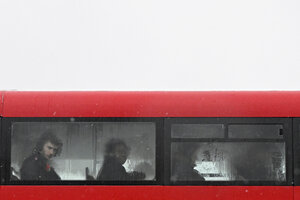‘Thank you’ matters: Why a stronger society starts with your bus driver

A bus with passengers crosses London Bridge during the morning rush hour, March 10, 2023. A group of academics and transport officials chose 150 London buses and placed stickers on the windows prompting passengers to say “hi” and “thank you.” The signs bumped interactions between drivers and passengers about 30%.
Toby Melville/Reuters/File
London
It’s tough to ask people for money.
As a London bus driver, Maurice must shepherd passengers who try to dodge the card reader. His requests have drawn expletives and aggression.
“More people want to fight lately because they don’t have money [to pay the fare],” says Maurice, who declined to give his last name for privacy reasons. “There’s a cost-of-living crisis. ... It’s gotten worse.”
Why We Wrote This
Saying hello can go a long way in building social connections, and researchers in London found a simple way to encourage such behavior. But their study raises questions about the barriers modern humans face in creating community.
So when a group of academics and transport officials tried to improve driver-passenger relations, Maurice was skeptical. The research group chose 150 London buses and placed stickers on the windows prompting passengers to say “hi” and “thank you.” For several months, it stationed observers to watch for changes.
After the signs went up, more people acknowledged Graham Nelson, who steers the No. 211 between Hammersmith and Waterloo. Some even said thank you.
“It’s not life-changing, but it does make you feel better,” says Mr. Nelson, who’s been a bus driver for about a decade. “It’s normally pretty grim.”
More people did say hello overall after the signs went up, bumping interactions between drivers and passengers about 30%. That’s significant enough that researchers believe these methods could be deployed elsewhere to promote stronger social connection.
Essential workers come across so many people on a day-to-day basis, and they present huge, untapped potential for connection, says Grainne O’Dwyer, senior program manager of Neighbourly Lab, a research nonprofit that partnered on the study.
“Small interactions matter, and they are a bedrock on which you can build,” says Ms. O’Dwyer. “Communities can support themselves if they’re more resilient and work together, and feel they have someone to rely on. ... There’s lots of value in social connection.”
Pat Engele has taught her children to acknowledge their bus driver since they were practically in diapers.
“They’re everyday people like the rest of us, and it just makes the job a lot easier if someone greets you in the morning,” says Ms. Engele. “When we get off, we say thank you.”
Over the years, her boys have gotten to know the drivers on the route between home and school. “We have a rapport with them,” she says. “We’ve built that relationship over the years – my eldest is 16.”
Imagine if people developed similar rapport elsewhere in their community, says Ms. O’Dwyer of Neighbourly Lab.
A shopkeeper might see 100 or 200 people come through their door every day. A street sweeper might walk past 300 people. A grocery store worker will see even more. These are all networks of untapped potential, she says.
“There’s growing evidence that social connection has value,” says Ms. O’Dwyer. “It’s also just a very basic human need to say, ‘I feel respected. I feel seen.’ And very simple nudges that you can put in context that can have a big, big impact.”
Like the sign on the bus, for example. In that study, the stickers were installed on driver entry and exit doors on buses across London. Just reminding passengers to greet the drivers prompted 140 million more interactions between drivers and passengers, says Ms. O’Dwyer, whose study was jointly undertaken by Transport for London and the University of Sussex.
What’s next for behavioral scientists is to figure out what makes such interactions so rare. The “reward circuitry” of the brain encourages connection, says Nicholas Epley, a behavioral scientist and psychologist at the University of Chicago.
“If you feel better saying hi to your bus driver, why don’t people do it more?” asks Dr. Epley.
Society shapes how one is expected to interact in public. But there’s also the fear of the unknown, says Dr. Epley.
“Reaching out – it’s a little like going into the ocean when there could be sharks. Our brains aren’t very good at handling uncertainty. Even a small dose of it can cause us to be reluctant to do things,” he says.
Dr. Epley calls this disconnect a “fundamental paradox at the core of human life.”
“We’re happier and healthier when we reach out and engage with other people. And yet in so many parts of daily life, we seem reluctant,” he says. “And that’s a real puzzle.”
Ultimately, to be successful in life – as a person, a government, an economy, or a society – one must be constantly cooperating. And that relies on trust, says Dr. Epley.
Driving a car without crashing into another depends on everyone following the rules, for example. Feelings such as guilt or remorse that prompt a morality toward others also help prompt cooperation among nonkin, he explains.
“That is so important for our success and our survival on this planet, that it’s built into us as an evolutionary mechanism,” says Dr. Epley.
As for Maurice back at the Hammersmith bus station, as he takes a break between shifts, he doesn’t mind the hellos. But what he’d really like? “Wages. More money.”

